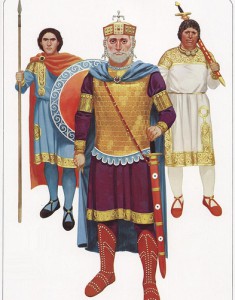The Game of Names
 Ryan asks what the two “halves” of the Roman Empire (German and Byzantine)- thought of each other. The word ‘dysfunctional’ about sums it up. Their relationship over the six and a half centuries of their co-existence was perpetually stormy: two empires (neither of which controlled Rome) arguing over who was really ‘Roman’. Generally speaking, the Byzantines considered Charlemagne and his successors to be jumped-up barbarians, uncouth boors pretending to be something that they were clearly not. Constantinople tried its best to pretend that the Holy Roman Empire didn’t exist, and when power politics made that impossible, they reluctantly admitted that the German monarch was an ‘emperor’ (though not a Roman one).
Ryan asks what the two “halves” of the Roman Empire (German and Byzantine)- thought of each other. The word ‘dysfunctional’ about sums it up. Their relationship over the six and a half centuries of their co-existence was perpetually stormy: two empires (neither of which controlled Rome) arguing over who was really ‘Roman’. Generally speaking, the Byzantines considered Charlemagne and his successors to be jumped-up barbarians, uncouth boors pretending to be something that they were clearly not. Constantinople tried its best to pretend that the Holy Roman Empire didn’t exist, and when power politics made that impossible, they reluctantly admitted that the German monarch was an ‘emperor’ (though not a Roman one).
The Franks for their part, acted like a younger sibling. They viewed the ‘Greeks’ as soft, effeminate, easterners, unworthy of the name ‘Roman’, but were at the same time a bit insecure and jealous of the older empire’s greater legitimacy. They at first stopped calling themselves Roman to appease Constantinople, and even when they resumed the claim, German monarchs would occasionally cross the border in southern Italy (where the two empires touched) to seek formal recognition of their titles, and ask for marriage alliances. This finally paid off in 972 when the Byzantine princess Theophano married the German emperor Otto II. Their son- Otto III- was therefore a union of both crowns and was probably the best hope for a reunification of the old Roman Empire. Unfortunately, however, he died of a fever at age 21 and the empires resumed their antagonistic stances.
There was one more brief moment of cooperation. During the reign of the pro-western Manuel Comnenus, the German emperor Conrad III led the (disastrous) 2nd Crusade through Constantinople. The two became close friends, with Manuel personally nursing his brother-monarch back to health after an injury suffered during the campaign. But when they exited the scene, relations quickly soured. The terrifying Frederick Barbarossa (Conrad’s successor) threatened to sack Constantinople and throw its emperor into prison, and several of his successors invaded Byzantine territory.
The Holy Roman Empire never succeeded in getting Constantinople to recognize it as an equal, but it did outlast it. Though its power largely collapsed in the 13th century, the empire limped along until the 19th, finally being swept aside during the Napoleonic Wars. Before it disappeared, however, it had one last parting shot at its (by now) long dead adversary. In 1557, the German humanist Hieronymus Wolf published a history of the medieval Greek world. Not wanting to refer to the impostors in Constantinople as ‘Roman’ (since the real Roman Empire was in Germany) he coined a new term for them.
“Byzantine”